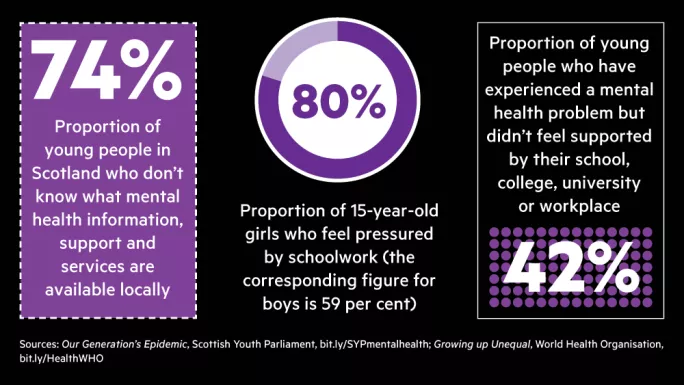How a few kind words could help a student in crisis

One Sunday evening in January 2008, two weeks before his 21st birthday, Jonny Benjamin decided to kill himself.
And he would have done so, if it wasn’t for the kindness of a passer-by, who persuaded him not to jump off Waterloo Bridge in London.
The message that Mr Benjamin wants to spread today is that a timely intervention from a teacher can help to turn troubled young lives around, long before someone reaches the point of no return.
Now a mental health campaigner, he has told TESS that teachers shouldn’t shy away from asking pupils direct questions about their wellbeing. “Don’t be afraid to talk and ask those questions [such as] ‘Are you struggling at the moment?’ or even ‘Are you self-harming?’ ” he said.
‘Don’t be afraid to talk and ask “Are you struggling?” or even “Are you self-harming”’
Sometimes pupils feel that they need “permission” before they can talk about their mental health difficulties, Mr Benjamin added, and even those who don’t open up may be inwardly reassured by a teacher’s interest.
“If they’re not ready to talk, just knowing that the teacher is there and recognises that they might be struggling, that someone is there and cares - that can make a real difference,” he said.
Mr Benjamin advised teachers to be wary of the common misconception that mental health problems were “just a phase” or “part of being a teenager”.
While this might be true in some cases, failure to act early could put pupils at greater risk of long-term problems, he warned.
“If you feel like something is going on, don’t wait,” said Mr Benjamin, who addressed the Children in Scotland charity’s annual conference in Cumbernauld earlier this month.
‘Boys don’t open up’
Another mental health campaigner, Dick Moore, a former headteacher, has also railed against the “stiff upper lip” attitude that prevents many British boys and men from talking about their feelings.
Mr Moore, whose son Barney took his own life at the age of 21 in 2011, told a separate mental health event for teachers in Glasgow that boys shouldn’t feel that it is “weak, soft or girly” to open up.
He stressed the need for schools, teachers and parents to be far more “proactive” in dealing with emotions.
Mr Moore also told teachers at the event - entitled Children and Young People Under Pressure - that even very small children should be taught what emotions are and where they come from.
He talked about the reaction of male pupils when he described feeling low, listening to music that reminded him of his son and sobbing for 10 minutes, then emerging from that experience “better, somehow lighter, like I can go about my business again”.
This challenged the preconceptions of the boys, who would think, “This bloke, surely he doesn’t cry - he’s a headteacher, he’s a rugby player, he clearly likes a beer, he thinks he’s funny, he’s a season-ticket holder at Fulham Football Club.”
Mr Moore urged teachers to take a stand if they felt that their school prioritised exam pass rates more than mental health.

Relationships are crucial
Jackie Brock, chief executive of charity Children in Scotland, said that good teacher-pupil relations were vital to a school’s approach. “This relational aspect - a teacher listening to a young person non-judgmentally, and the young person feeling valued and included - can be crucial in mitigating against mental health problems.
Euan Duncan, a guidance teacher and president of the Scottish Secondary Teachers’ Association (SSTA), said mental health had lost its sense of “taboo” in school PSHE (personal, social and health education) lessons, but it was “taking time for the wider community to catch up”.
Mr Duncan added that guidance teachers were “well placed” to provide some help to troubled pupils, but that they were not counsellors or mental health professionals, and the best support came from working closely with services outside school.
But he warned that there were “often very lengthy waits for help” from mental health services - up to 18 weeks - which “as a proportion of a young person’s life is a very long time indeed”.
Unions have also become increasingly concerned about teachers’ mental health and the support available to them.
One teacher who has experienced depression told TESS that, since he had returned to work after taking time off to overcome the illness, no senior manager had asked about his mental health. He added that some people were still unwilling to admit to having mental health problems in the first place.
You need a Tes subscription to read this article
Subscribe now to read this article and get other subscriber-only content:
- Unlimited access to all Tes magazine content
- Exclusive subscriber-only stories
- Award-winning email newsletters
Already a subscriber? Log in
You need a subscription to read this article
Subscribe now to read this article and get other subscriber-only content, including:
- Unlimited access to all Tes magazine content
- Exclusive subscriber-only stories
- Award-winning email newsletters